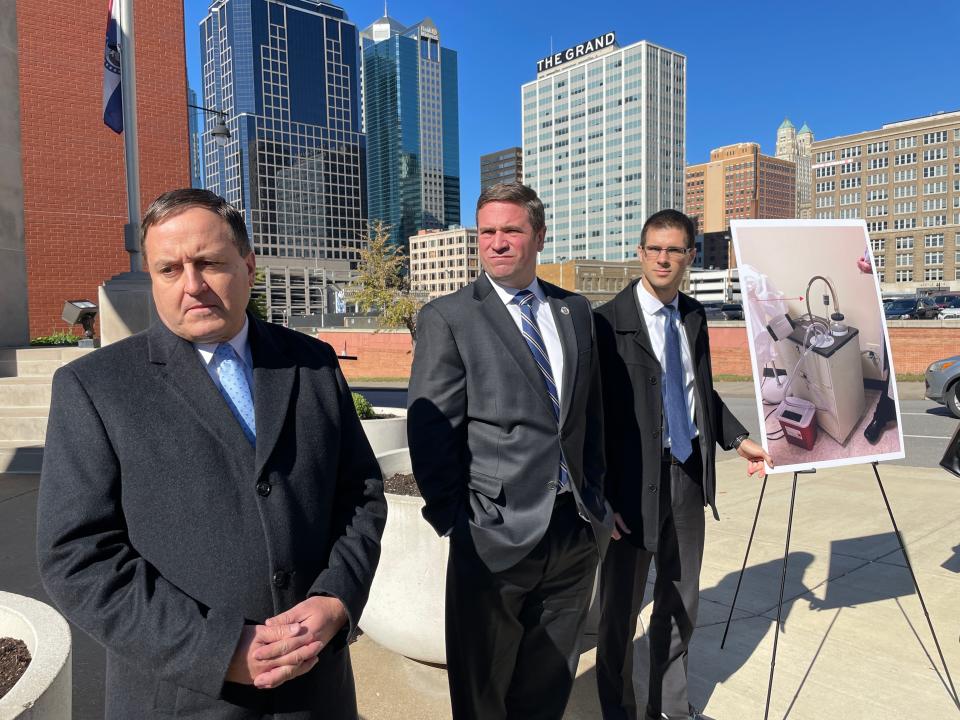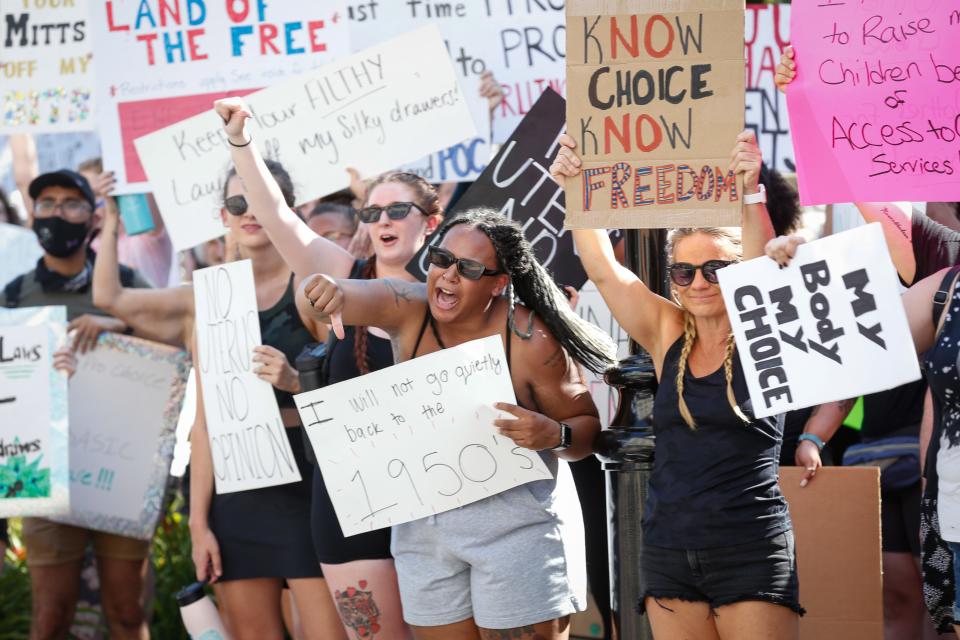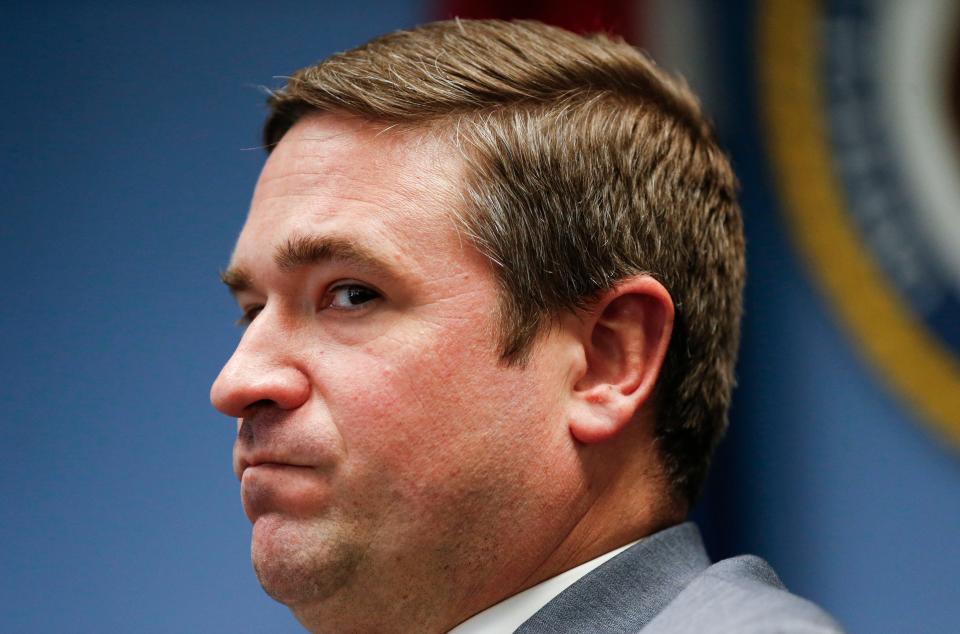While one abortion legal saga ends, other advocates launch signature collection campaign
- Oops!Something went wrong.Please try again later.
- Oops!Something went wrong.Please try again later.
In a long-fought legal victory for some abortion-rights advocates, the Missouri Supreme Court declined to hear two cases challenging the ballot summary language and fiscal note summary for initiative petitions seeking to enshrine reproductive rights in the state constitution.
Missouri Secretary of State Jay Ashcroft’s ballot language was challenged by the filer of the petitions and the ACLU of Missouri for being biased and misleading. Both the Cole County Circuit Court and Missouri Western District Court of Appeals agreed and provided new ballot summary language.
“The courts' repeated rejection of the Secretary of State's arguments verify that his case has no legal bearing but, instead, shows he will sacrifice Missourians' constitutional rights to gain the support and funding of special interest organizations to advance his political career,” Tom Bastian, spokesperson for the ACLU of Missouri, said in an emailed statement.

Ashcroft, who is running for governor in 2024, received the single endorsement of Missouri Right to Life, an anti-abortion group in the state.
“We stand by our language — it fairly and accurately reflects the scope and magnitude of each petition,” Ashcroft said in an emailed statement. “My responsibility as secretary of state is to make sure the people of Missouri have ballot language that they can understand and trust. If these petitions make it to the ballot, the people will decide. I will continue to do everything in my power to make sure Missourians know the truth.”
His language asked voters if they wanted to “allow for dangerous, unregulated, and unrestricted abortions, from conception to live birth, without requiring a medical license or potentially being subject to medical malpractice.”
Cole County Circuit Court Judge Jon Beetem rewrote Ashcroft’s language to ask voters if they want to establish the “right to make decisions about reproductive health care, including abortion and contraception,” which would abolish the statewide ban on abortion.
The Western District Court of Appeals mostly agreed with Beetem’s summary language, but found that the circuit court erred when it failed to include language that indicated that these initiative petitions would remove the ban on abortion “at any stage of gestation.”
An abortion performed after 24 weeks or fetal viability would have to be medically necessary for the health of the mother, but this is, as Appeals Court Judge Thomas Chapman said during the October hearing, a “sea change” from the restrictions under Roe v. Wade.
The remainder of Ashcroft’s language in this clause was affirmed to be inaccurate, and “does not give voters a sufficient idea what the proposed amendment[s] would accomplish.”
Ashcroft’s language would have led voters to believe that anyone, regardless of medical training, could conduct abortions in unsanitary conditions. The court did not find that any of the initiatives would permit such acts.
“Disallowing health and safety regulations — including requirements that physicians perform abortions and that they maintain medical malpractice insurance — is not a probable effect of the initiatives,” according to the opinion of the court.

Another case heard alongside the challenge to Ashcroft’s ballot summary language sought to strike down Auditor Scott Fitzpatrick’s fiscal note summary that estimates any projected monetary gains or losses to the state if the ballot initiative passes.
However, the challenge to the fiscal note summary came not from abortion-rights advocates, but from Republican lawmakers and anti-abortion activists who felt that Fitzpatrick’s estimate was too low. Fitzpatrick, though he vehemently opposes abortion on a personal level, upheld the responsibilities of his office to prepare a fiscal note based upon the information provided to him.
These lawmakers raised concerns that the state could lose its federal Medicaid funding, a claim contradicted by the Department of Social Services, which manages the state’s Medicaid program, which said it foresees no fiscal losses.
Additionally, the fiscal note summary includes an estimated loss of $51,000 in potential future tax revenue from Greene County — based on the idea that legal abortions would reduce the number of future taxpayers — which the plaintiffs thought Fitzpatrick should have extrapolated statewide.
The Cole County Circuit Court and the Western District Court of Appeals disagreed with these assertions, and wrote in its opinion that, “the Auditor’s fiscal note and fiscal note summary for the proposed initiative petitions submitted by Dr. Fitz-James are fair and sufficient.”
In an emailed statement to the News-Leader, Fitzpatrick defended the work of his office in drafting the fiscal notes while reiterating his own personal opposition to abortion.
"Throughout this process I have upheld the oath of office I swore to the people of Missouri to serve in this position with integrity, and as State Auditor, you can trust that I always provide you with the facts, no matter how uncomfortable they may be," Fitzpatrick wrote. "As a father, who has seen firsthand the fragility and preciousness of life, and as a public servant who has always been committed to the sanctity of life at every stage, I will use my voice to encourage Missourians to decline to sign these petitions."
The Missouri Supreme Court's decision not to hear the case leaves Fitzpatrick’s fiscal note summary intact.
"Now that these cases are fully adjudicated and ten judges at every level of the court system have confirmed that my office did its job in accordance with the law, I won't hesitate to stand at the forefront of the battle to keep Missouri pro-life," Fitzpatrick said.
The next struggle: Collecting more than 171,000 signatures before May 2024
After months of legal battles, Dr. Anna Fitz-James, who filed 11 of 17 initiative petitions to restore access to abortion in Missouri, along with Missourians for Constitutional Freedom, a political action committee, will have the final ballot summary language to circulate as supporters collect signatures.
They will need to collect more than 171,000 signatures by early May to be included on the 2024 ballot. While it should usually take no more than 54 days to certify a ballot measure, legal battles have dragged on for more than eight months since the petitions were filed.
Another group seeking to restore limited access to abortions in Missouri is facing its own legal challenges, but that isn’t stopping their efforts to collect signatures.
Jamie Corley, in conjunction with the Missouri Women and Family Research Fund, is also challenging ballot summary language prepared by Ashcroft, and a fiscal note summary prepared by Fitzpatrick, including a large cost estimate from Missouri Attorney General Andrew Bailey.
“We got language from the Secretary of State and a fiscal note from the Attorney General, that we do not feel meets the criteria of what is fair,” Corley said. “We’re challenging them in court.”

Bailey said it would cost $21 million to litigate abortion-related legal challenges, as his office will refuse to hear these cases, forcing state clients to seek outside counsel paid for by taxpayer funding.
“I'm concerned that a court may look at my advocacy and the wins I've delivered in defense of the Missouri Heartbeat Bill, which I believe to be the proper policy position to protect the health and safety of women and children in the state of Missouri, and might block me from defending that measure in court, and that would cost the state of Missouri,” Bailey said.
The primary challenge to Bailey’s cost estimate is the fact that his office is up for election this year, meaning that, if he fails to win, his successor may not be so opposed to litigating abortion cases.
“At the end of the day, the people's elected representatives enacted a bill that reflects the values of the people of the state of Missouri that protects women and children's health and safety, and I think that every attorney general should be defending that state statute,” Bailey said.
More: Initiative petitions came under fire in 2023. Experts forecast more of the same in 2024.
A hearing date has not yet been set for the legal challenge from Corley, but that is not stopping supporters from gathering signatures in support of her measure.
“That does not prohibit us from gathering signatures,” Corley said. “We can litigate the ballot language to make sure that in 2024 when voters go to the voting booth, they are presented with fair and accurate information about the amendment. We can do that while we are collecting signatures.”
From the six petitions filed, one has been chosen for circulation in collecting signatures. Corley’s petitions have been positioned as more of a middle ground between those filed by Fitz-James and the near-total abortion ban currently in place in the state.
“We really don't see ourselves as part of the pro-choice movement,” Corley said.
The petition that they are circulating would allow abortions to be performed until 12 weeks of gestation, or before fetal viability in the case of rape, incest, fatal fetal abnormality or risks to the health of the mother, although victims of rape of sexual assault must have reported the incident to a crisis hotline.
“We feel like what we're putting forward can garner very solid support from both Republicans and Democrats, pro-life and pro-choice groups, while expanding meaningful access in a state where we currently have none,” Corley said.
This article originally appeared on Springfield News-Leader: Missouri Supreme Court declines to hear appeal in abortion-rights case

